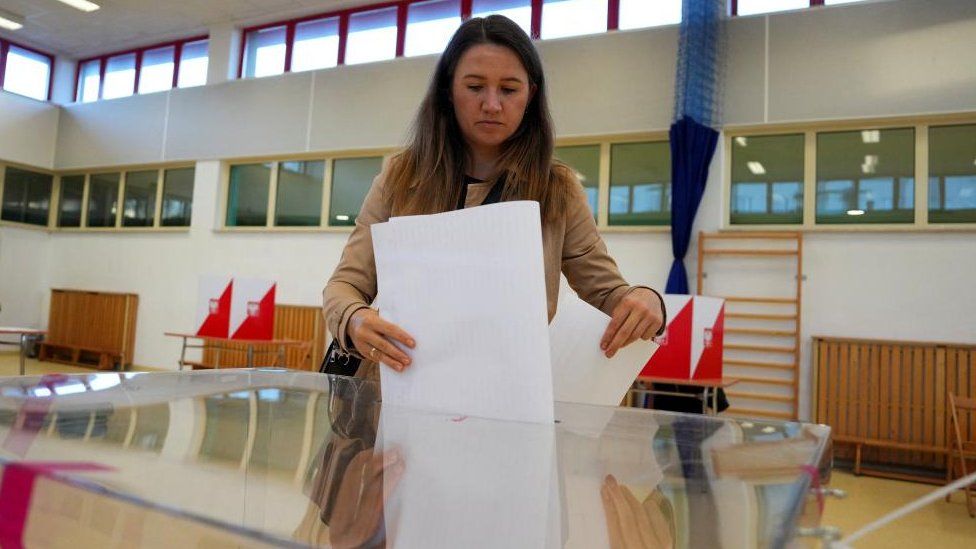The right-wing populist Law and Justice party is on course to win most seats in Poland’s general election, an exit poll suggests, but may struggle to secure a third term in office.
Known as PiS, it is set to win 36.8% of the vote, with the centrist opposition on 31.6%, says the Ipsos poll.
Donald Tusk’s Civic Coalition is aiming to bring an end to eight years of PiS rule under leader Jaroslaw Kaczynski.
And if the exit poll proves correct he may have a greater chance of victory.
“Poland won, democracy has won. This is the end of the bad times, this is the end of the ruling party, PiS,” he told jubilant supporters in Warsaw.
The ruling party hailed the Ipsos poll, which suggested it was heading for 200 seats in the 460-seat Sejm or parliament, but Mr Kaczynski said it was unclear if they would win another term in office.
PiS may fall some way short of the 230 seats needed for a majority, and may not be able to rely on the far-right Confederation party, whose leader admitted it had fared far worse than expected.
Mr Tusk’s party may be able to reach a deal with two other centrist parties, if the exit poll is borne out by results.
Big queues formed outside polling stations across Poland and beyond.
“The campaign was very strong and emotional, that’s why there are so many people,” a PiS voter called Agnes told the BBC.
Whoever wins, Poland’s war support for Ukraine is unlikely to change.
“We have a war on our border. We have to be sure the government will take us in the right direction and be more resistant to Russia,” said another voter called Ela.
But Mr Kaczynski has painted his rival as a puppet of Berlin and Brussels and vowed to maintain his party’s strong anti-migration policies.
Civic Coalition leader Donald Tusk has described the vote as Poland’s most important since the fall of communism and vital for its future in the European Union.
Poland’s national election office said with four hours’ left of voting that turnout among the 29 million voters was 57%. They voted in more than 30,000 polling stations, and there were long queues outside Poland, with almost 400,000 expats registered to vote.
“They’re the most important elections I’ve voted in during my lifetime,” said Magdalena Bozek as she queued up to vote in London. “It’s been quite a difficult eight years for us, for pro-Europeans.”
Poland is divided into 41 districts and has a proportional representation system for its parliament, based on party lists. Expat votes count towards the Warsaw district.
Five parties look set to cross the 5% threshold and enter the 460-seat Sejm or parliament. Poles are also voting for the upper house, the Senate.
